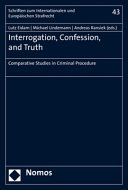

Most ebook files are in PDF format, so you can easily read them using various software such as Foxit Reader or directly on the Google Chrome browser.
Some ebook files are released by publishers in other formats such as .awz, .mobi, .epub, .fb2, etc. You may need to install specific software to read these formats on mobile/PC, such as Calibre.
Please read the tutorial at this link: https://ebookbell.com/faq
We offer FREE conversion to the popular formats you request; however, this may take some time. Therefore, right after payment, please email us, and we will try to provide the service as quickly as possible.
For some exceptional file formats or broken links (if any), please refrain from opening any disputes. Instead, email us first, and we will try to assist within a maximum of 6 hours.
EbookBell Team

4.0
36 reviewsHowever, the legal demands are ambiguous when it comes to more subtle means of obtaining a confession. Does slapping a person once or twice constitute torture? Even if the answer is affirmative, we still have to consider what Fred Inbau wrote in 1961: “I am unalterably opposed to the use of any interrogation technique that is apt to make an innocent person confess. (…) I do approve of such psychological tactics and techniques as trickery and deceit (…) to secure incriminating information from the guilty.” So maybe, as a German law professor wrote in the 1970s, the defendant’s choice to remain silent is nothing but an artful “trick” obstructing the truth finding process and the administration of justice. Thus, the question is where the line has to be drawn. Is it sufficient to
warn defendants that they have a right to remain silent and to have the assistance of a lawyer for their defense? What is the current status of the privilege against self-incrimination? Should a resulting confession be inadmissible if warnings were not given like Miranda v. Arizona stipulated in 1966 and the German Federal Criminal Court acknowledged some 25 years later as well? When has someone’s will been overborne and governing self-direction is lost, as Justice Felix Frankfurter put it in 1961? When, on the other hand, is truth discovered? More fundamentally: what is this thing called truth?
Scholars from the Unites States, the Netherlands, and Germany have
discussed these issues from their respective legal backgrounds and experiences in May 2019 at Bielefeld University and have contributed the papers you find in this volume. We were delighted to have you here for such a successful workshop!